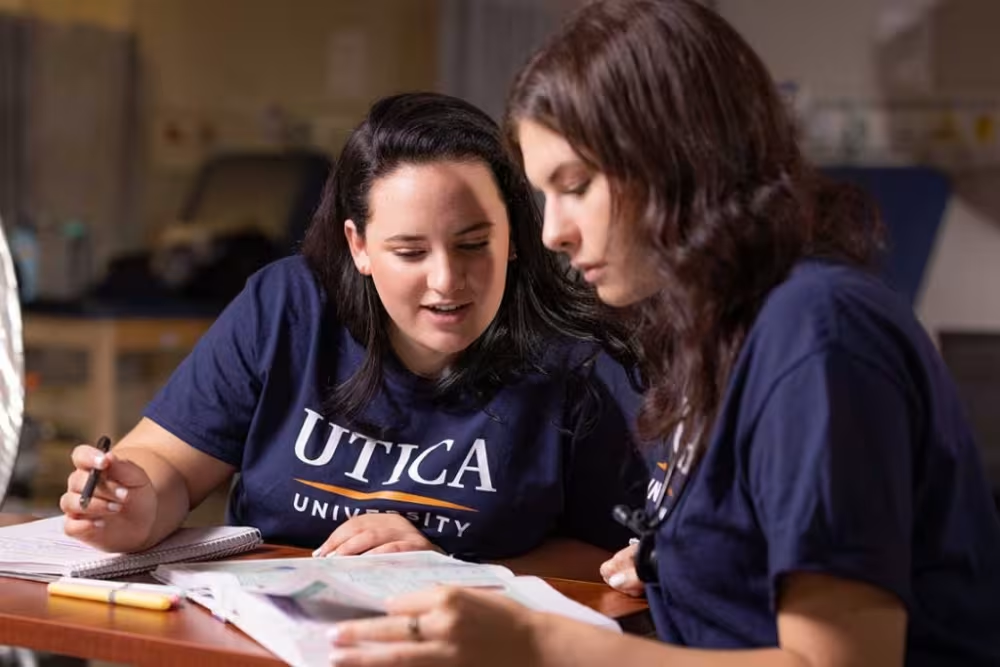BSN vs. MSN: Understanding the Differences in Nursing Degrees
Each blog post is dated and contains accurate information as of that date. Certain information may have changed since the blog post publication date. If you would like to confirm the current accuracy of blog information, please visit our ABSN program overview page or contact us at (866) 892-6747.
Classes held at our Syracuse learning site have been temporarily relocated to our main campus in Utica, New York. Speak with an admission representative to learn more.
Future nurses should know the differences between a BSN and an MSN. A B.S. in Nursing provides foundational nursing knowledge and prepares students to pursue an entry-level career in nursing. An M.S. in Nursing explores a specialty area in nursing and is designed for working nurses interested in career advancement.

Nurses need a strong command of many different nursing concepts and skills, which is why comprehensive nursing education is so vital when pursuing this career. If you’re thinking about transitioning to a career in nursing and you’re researching your options for education, you might have some confusion regarding the acronyms, such as BSN vs. MSN, and whether you need a bachelor’s vs. master’s degree to get started as a nurse.
As you explore your options for becoming a nurse, consider the differences between an undergraduate vs. graduate degree in nursing. You’ll also want to explore the career options available with a graduate degree instead of only an undergraduate nursing degree.
Differences Between a Master’s in Nursing vs. a Bachelor’s in Nursing
There are plenty of differences between a bachelor’s vs. master’s in nursing, specifically regarding the admission requirements and curriculum. There are also differences in expected career outcomes, as the B.S. in Nursing paves the way for entry into the field. In contrast, the Master of Science in Nursing is designed to allow working nurses to elevate their career qualifications and pursue advancement.
At Utica University, we offer both undergraduate and graduate degrees in nursing. Utica’s Accelerated Bachelor of Science in Nursing (ABSN) program is designed to help individuals switch careers to nursing. As an ABSN student, you could graduate with a B.S. in Nursing in as few as 16 months. After gaining some clinical experience, you might decide to enroll in one of Utica’s M.S. in Nursing programs, such as the M.S. in Family Nurse Practitioner.

Typical Admission Requirements
The admission requirements for any nursing program depend highly on the individual school, but there are some commonalities. If you were to apply to a traditional four-year bachelor’s in nursing program, you would be required to have a high school diploma or GED and a minimum GPA, which can vary.
ABSN programs like Utica’s have different admission requirements than traditional bachelor’s degree programs because they are tailored to career changers switching to nursing from another field. Because of this, ABSN programs require applicants to have either a non-nursing bachelor’s degree or a minimum number of college credits, along with a minimum GPA.
ABSN applicants may also need to complete degree requirement courses to ensure they have the proper academic foundation to succeed in nursing school.
While a completed degree is not always needed to apply for an undergraduate program, a degree is a requirement for applying to an M.S. in Nursing program. Additionally, applicants must meet minimum GPA requirements, hold an unencumbered RN license, demonstrate a minimum number of hours of work experience as an RN, and submit all other requested application materials.
In other words, the main difference between a master’s in nursing vs. a bachelor’s in nursing in terms of admission requirements is that the former requires you to be a working nurse, whereas the latter does not.

Make a plan for paying for nursing school with financial aid options, including scholarships and grants.
Focus and Curriculum
A traditional four-year B.S. in Nursing degree program includes nursing and general education courses, such as liberal arts classes. In contrast, an ABSN program focuses almost entirely on nursing education. This is possible thanks to students’ prior academic history and the degree requirement courses taken before enrollment.
In an ABSN program, you can expect the curriculum to provide a comprehensive exploration of nursing concepts and skills, from health assessments and pathophysiology to pharmacology and nursing informatics. The ABSN curriculum at Utica is taught via online coursework and in-person labs and clinical rotations. By the end of the program, you’ll be well-prepared for a wide range of nursing careers, from pediatrics to geriatrics and beyond.
The focus and curriculum of a master’s program in nursing are different. Rather than teaching foundational knowledge and exploring a broad survey of nursing competencies, a master’s program has a narrower focus. An M.S. in Nursing focuses on a particular nursing specialty or career, such as family nurse practitioner (FNP) or nursing educator.
Like the ABSN and traditional B.S. in Nursing programs, an M.S. in Nursing will combine didactic learning with hands-on experience. Didactic learning can often be done online. The hands-on experience is different than in an undergraduate program, however. Instead of arriving at the learning site for labs, students will typically complete practicum hours at a facility near them.
Duration
The duration for a traditional B.S. in Nursing program for applicants with only a high school background is four years. This timeline assumes that students are enrolled full-time and enjoy regular school breaks.
An accelerated B.S. in Nursing program, such as Utica’s ABSN program, can be completed in as few as 16 months across consecutive semesters. Other ABSN programs may differ slightly in length but will always be shorter than traditional programs.
The duration of a master’s degree in nursing can vary considerably from one program to the next. It also depends on whether you’re enrolled as a part-time or full-time student. A program might take one to three years, although approximately two years is typical.

Career Paths and Advancement Opportunities: BSN vs. MSN
A wide variety of nursing careers may be available to you with a B.S. in Nursing. An entry-level RN can pursue work in hospitals, doctors’ offices, specialty clinics, and schools. You might pursue a nursing career in medical-surgical nursing, emergency room nursing, critical care, or dozens of other nursing specialties.
If you don’t want to earn a graduate degree in nursing, you can pursue career advancement by earning certifications relevant to your nursing specialty. Certifications might help you become a charge nurse, for example.
If you compare the career outcomes for an undergraduate vs. graduate degree, it’s clear that earning a graduate degree provides better career advancement opportunities. Depending on your goals, you might be interested in any of the following careers with a graduate degree in nursing:
- Nurse manager
- Nurse administrator
- Nurse educator
- Nurse researcher
- Advanced practice registered nurse (APRN)
- Nurse practitioner (NP)
- Clinical nurse specialist (CNS)
- Certified registered nurse anesthetist (CRNA)
- Certified nurse-midwife (CNM)
If you choose to become an APRN, you must also obtain board certification after earning a graduate degree.

Career Outlook and Salary Expectations
The career outlook for both baccalaureate-prepared nurses and those with graduate degrees is robust. According to the U.S. Bureau of Labor Statistics (BLS), the expected job growth rate for registered nurses is 6% from 2023 through 2033, indicating that healthcare employers will need to hire about 197,200 new nurses during this period. The median annual salary for RNs was $93,600 as of May 2024.
If you become an APRN, you can look forward to even stronger job growth and higher salary expectations. According to the BLS, the job growth rate for most types of APRNs was 40% from 2023 to 2033, indicating a potential for 141,200 new nursing opportunities during this period. The median annual salary for most APRNs was $132,050 as of May 2024. Nurse anesthetists have the highest salary potential, with a median annual wage of $223,210.
Wondering what nursing school is like? Learn what to expect and how to prepare to succeed in nursing school.

Get Your Nursing Career Started at Utica University
Utica University’s ABSN and Advanced Standing B.S. in Nursing programs both enable you to earn a quality B.S. in Nursing in as few as 16 months upon completion of degree requirement courses. It’s a necessary first step toward eventually pursuing an advanced degree in nursing, such as through Utica’s Master of Science in Nursing Education program.
When you apply to Utica, you can choose from enrollment locations in Albany or Syracuse. Our two locations and three start dates per year allow us to enroll more students. Once enrolled, you will work with our Academic Success Coaches, who can help you overcome any obstacles.
Contact an admission representative today to get started.

